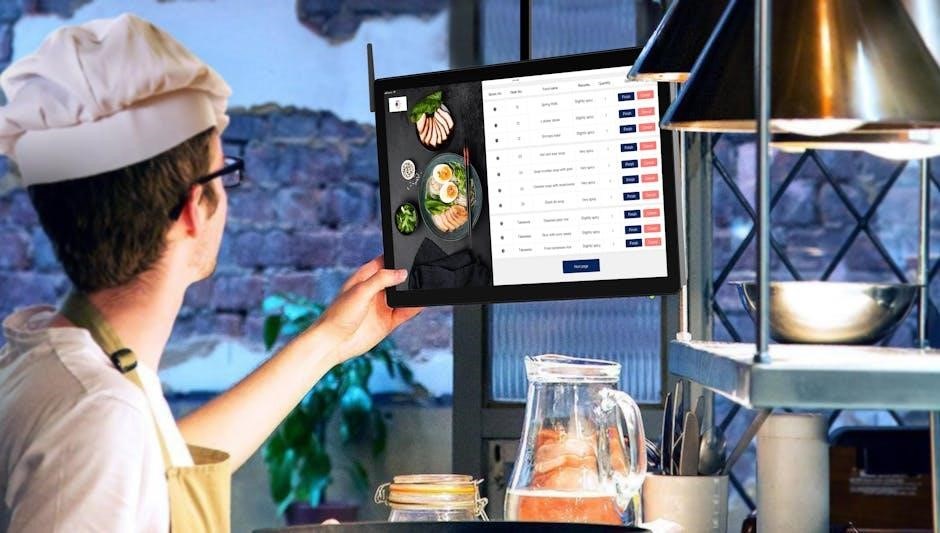A restaurant manager plays a pivotal role in overseeing daily operations, ensuring seamless functioning of the establishment․ Their duties encompass staff supervision, customer satisfaction, and financial oversight, blending operational and strategic responsibilities to drive business success․
Overview of the Role
A restaurant manager is a multifaceted professional responsible for ensuring the smooth operation of a dining establishment․ This role combines operational and strategic duties, requiring strong leadership, organizational, and interpersonal skills․ Core responsibilities include managing staff, overseeing customer service, and maintaining financial health․ The manager must ensure compliance with health and safety regulations while fostering a positive work environment․ They also play a key role in driving sales growth through effective marketing strategies and promotional activities․ The ability to adapt to changing customer preferences and industry trends is crucial for success․ Ultimately, the restaurant manager serves as the backbone of the establishment, ensuring high standards of service and food quality while maintaining profitability and customer satisfaction․ This role is ideal for individuals who thrive in fast-paced environments and are passionate about delivering exceptional dining experiences․
Importance of a Restaurant Manager in the Hospitality Industry
A restaurant manager is integral to the success of any hospitality establishment, ensuring efficient operations and high customer satisfaction․ They act as the backbone of the restaurant, overseeing daily activities and maintaining quality standards․ By effectively managing staff, finances, and customer relations, they directly impact the business’s profitability and reputation․ Their ability to resolve conflicts, implement strategies, and adapt to industry trends ensures a competitive edge․ A skilled restaurant manager fosters a positive work environment, leading to employee retention and improved service delivery․ Their role is crucial in balancing customer expectations with business goals, making them indispensable in the hospitality industry․ Their contributions significantly influence the overall dining experience and the establishment’s long-term success․

Primary Duties of a Restaurant Manager
A restaurant manager’s primary duties include overseeing staff, ensuring customer satisfaction, managing operations, handling finances, and maintaining health and safety standards to ensure smooth business operations․
Staff Management and Training
Staff management and training are critical duties for a restaurant manager․ This involves recruiting, hiring, and training employees to ensure they meet service standards․ Managers must delegate tasks effectively, fostering a productive work environment․ They also handle performance evaluations, providing feedback to improve staff efficiency․ Training programs focus on enhancing skills, from food preparation to customer interaction, ensuring consistency in service delivery․ Additionally, managers address employee concerns, mediate conflicts, and maintain workplace morale․ Effective staff management is essential for delivering exceptional customer experiences and achieving operational success․

Customer Service and Satisfaction
Ensuring high levels of customer satisfaction is a cornerstone of a restaurant manager’s role․ This involves monitoring service quality, addressing customer complaints promptly, and implementing measures to exceed expectations․ Managers must maintain a welcoming atmosphere, ensuring that guests feel valued․ They also analyze feedback to identify areas for improvement, whether in food quality, service speed, or overall experience․ Building strong relationships with regular customers is crucial, fostering loyalty and repeat business․ Additionally, managers may oversee loyalty programs or special events to enhance customer engagement․ By prioritizing customer satisfaction, managers contribute directly to the restaurant’s reputation and long-term success in a competitive market․
Operational Oversight
Operational oversight is a critical responsibility of a restaurant manager, involving the day-to-day management of restaurant activities to ensure smooth and efficient operations․ This includes supervising staff, managing schedules, and ensuring compliance with health and safety regulations․ Managers must monitor kitchen processes, dining area services, and overall workflow to maintain high standards; They address operational challenges, such as supply chain issues or equipment malfunctions, promptly to minimize disruptions․ Additionally, they oversee inventory management, ensuring adequate stock levels without overstocking․ Effective operational oversight requires strong problem-solving skills and attention to detail to maintain consistency and quality in service delivery․ By managing operations efficiently, restaurant managers contribute to a positive customer experience and overall business success․
Financial Management
Financial management is a cornerstone of a restaurant manager’s role, ensuring the establishment operates within budget and achieves profitability; This involves monitoring labor costs, inventory expenses, and overheads to optimize resource allocation․ Managers analyze sales data to identify trends and opportunities for cost reduction or revenue growth․ They prepare financial reports, track cash flow, and ensure compliance with accounting standards․ Additionally, they implement pricing strategies and control wage costs to maximize profit margins․ Effective financial management requires balancing short-term needs with long-term goals, ensuring the restaurant remains financially sustainable․ By maintaining fiscal discipline, restaurant managers play a key role in driving business success and achieving profitability targets․

Health and Safety Compliance
Ensuring health and safety compliance is a critical responsibility for restaurant managers, safeguarding both employees and customers․ This involves adhering to food safety regulations, maintaining hygiene standards, and conducting regular audits to prevent hazards․ Managers must stay updated on local health codes and implement protocols to address potential risks, such as foodborne illnesses or workplace accidents․ They oversee proper food handling, storage, and disposal practices, ensuring all staff are trained in safety procedures․ Additionally, they manage emergency preparedness, including fire safety and first aid․ By fostering a culture of safety, restaurant managers protect the establishment’s reputation and legal standing, ensuring a secure environment for everyone․

Day-to-Day Responsibilities
Managing daily operations, supervising staff, and ensuring smooth restaurant functioning are key․ This includes coordinating tasks, delegating responsibilities, and maintaining high service and food quality standards consistently․
Supervising Restaurant Operations
Supervising restaurant operations involves managing day-to-day activities to ensure efficiency and productivity․ This includes overseeing workflows, monitoring budgets, and maintaining safety standards․ The manager ensures that all processes align with business goals, providing guidance to staff and addressing operational challenges promptly․ They also monitor kitchen and dining areas to guarantee smooth service delivery and high-quality output․ Effective supervision ensures customer satisfaction, adherence to health regulations, and optimal resource utilization․ By maintaining visibility and control, the manager fosters a well-organized and productive environment, crucial for the restaurant’s success and reputation․

Coordinating with Other Departments
Coordinating with other departments is essential for ensuring seamless restaurant operations․ The manager acts as a liaison between the kitchen, front-of-house staff, and other support teams․ This involves communicating effectively to align goals, resolve issues, and improve efficiency․ For example, the manager collaborates with chefs to plan menus, ensures inventory levels are maintained with procurement teams, and works with marketing to promote special events․ Strong coordination fosters teamwork, enhances service quality, and improves customer satisfaction․ By maintaining open lines of communication, the manager ensures that all departments work cohesively toward common objectives, contributing to the restaurant’s overall success and smooth functioning․
Monitoring Budgets and Sales Performance
Monitoring budgets and sales performance is a critical responsibility of a restaurant manager․ They analyze financial reports to track revenue, expenses, and profitability, ensuring the restaurant operates within budgetary limits․ By identifying trends and variances, managers can adjust strategies to optimize spending and boost sales․ This includes controlling labor costs, inventory expenses, and overheads while maintaining service quality․ Regular reviews of sales data help identify opportunities to enhance menu offerings or pricing․ Effective budget monitoring ensures cost-effectiveness without compromising customer satisfaction․ The manager also collaborates with finance teams to forecast future performance and implement corrective measures if needed․ This financial oversight is vital for achieving profitability and sustaining long-term business success․
Maintaining High Standards of Food and Service Quality
Maintaining high standards of food and service quality is essential for a restaurant’s reputation and customer satisfaction․ The manager ensures that all dishes meet culinary standards by sourcing fresh ingredients and monitoring kitchen protocols․ They conduct regular tastings and audits to uphold food quality․ Additionally, they oversee service staff to ensure prompt, courteous, and attentive interactions with guests․ Feedback from customers is reviewed to identify areas for improvement․ The manager also implements quality control measures, such as staff training programs and menu reviews, to maintain consistency․ By focusing on both food and service excellence, the restaurant can build a loyal customer base and achieve long-term success․ This commitment to quality is a cornerstone of effective restaurant management․
Ensuring Safety and Hygiene
Ensuring safety and hygiene is a critical responsibility for restaurant managers․ This involves enforcing health and safety regulations, conducting regular kitchen and dining area inspections, and maintaining cleanliness standards․ Managers must train staff on proper food handling, storage, and hygiene practices to prevent contamination․ They also oversee waste management and pest control measures to ensure a safe environment․ Additionally, managers are responsible for handling incidents, such as foodborne illnesses, and implementing corrective actions․ Regular audits and staff accountability checks are conducted to uphold hygiene protocols․ By prioritizing safety and hygiene, managers protect customers, employees, and the restaurant’s reputation, ensuring compliance with legal requirements and fostering a safe dining experience․
Strategic Responsibilities
Developing strategies, planning expansion, and conducting market research are key․ Implementing promotions and discounts drives growth and customer loyalty, ensuring long-term business success and sustainability․
Developing Sales and Marketing Strategies
Restaurant managers create sales and marketing strategies to attract customers and boost revenue․ This includes analyzing market trends, designing promotional campaigns, and implementing discount schemes to capture market share․ They collaborate with other departments to ensure cohesive branding and messaging․ Effective strategies often involve understanding target demographics and tailoring offerings to meet their preferences․ Additionally, managers monitor the effectiveness of these strategies through sales performance and customer feedback, making adjustments as needed to optimize results․ The goal is to drive growth, increase customer loyalty, and maintain a competitive edge in the hospitality industry․ These efforts are integral to achieving business objectives and ensuring long-term success․
Planning Business Expansion and Growth
Planning business expansion and growth is a critical responsibility of restaurant managers․ This involves preparing strategic plans to identify opportunities for growth, such as opening new locations or expanding menu offerings․ Managers conduct market research to analyze trends and customer preferences, ensuring informed decision-making․ They collaborate with senior management and other teams to set realistic goals and timelines for expansion․ Additionally, they assess financial feasibility and resource allocation to support growth initiatives․ By staying attuned to market dynamics, restaurant managers can identify viable opportunities to increase market share and enhance the establishment’s reputation․ Effective planning ensures sustainable growth while maintaining high standards of service and quality, ultimately contributing to the long-term success and profitability of the business․

Implementing Promotional and Discount Schemes
Implementing promotional and discount schemes is a key responsibility of restaurant managers to attract customers and boost sales․ This involves designing and executing marketing strategies such as special offers, loyalty programs, and seasonal discounts․ Managers analyze customer preferences and market trends to create targeted promotions that align with the restaurant’s brand and goals․ They also collaborate with marketing teams to develop eye-catching materials like flyers, emails, and social media posts․ Additionally, they ensure that promotional items are accurately represented on menus and signage․ By monitoring the effectiveness of these schemes, managers can adjust strategies to maximize customer engagement and revenue․ Regular feedback from customers and staff helps refine these initiatives, ensuring they remain relevant and impactful․ Effective implementation of promotions drives customer loyalty and contributes to the restaurant’s financial success․
Conducting Market Research
Conducting market research is a critical responsibility of restaurant managers to identify trends, competitor strategies, and customer preferences․ This involves analyzing data on dining habits, menu preferences, and pricing to inform decisions․ Managers gather feedback through surveys, reviews, and social media to understand customer needs․ They also monitor competitors’ offerings and pricing to stay competitive․ By identifying market gaps, managers can develop tailored menu items or promotions that attract specific demographics․ Market research helps in creating strategies to differentiate the restaurant from others, ensuring relevance and appeal․ Regular analysis ensures the restaurant adapts to changing consumer demands and industry trends, maintaining its competitive edge․ This proactive approach enables the restaurant to innovate and sustain long-term growth in a dynamic market environment․
Leadership and Team Building
Restaurant managers inspire and guide their teams, fostering a positive work culture․ They lead by example, encourage collaboration, and empower employees to achieve organizational goals effectively․
Leading and Motivating the Restaurant Team
Leading and motivating the restaurant team is a cornerstone of a manager’s role․ They set clear goals, foster accountability, and create a supportive environment that encourages growth․ By recognizing achievements and addressing challenges, managers build trust and morale․ Effective leadership ensures seamless operations, enhances team cohesion, and drives overall performance․ Managers also empower employees by delegating tasks, providing feedback, and offering development opportunities, which helps in retaining skilled staff and maintaining high service standards․ Their ability to inspire and guide directly impacts the restaurant’s success and customer satisfaction․
Building Relationships with Employees and Customers

Building strong relationships with both employees and customers is essential for a restaurant manager․ By fostering trust and open communication, managers create a positive work environment that encourages collaboration and loyalty․ With employees, managers focus on understanding their needs, providing support, and recognizing contributions, which enhances job satisfaction and retention․ With customers, managers ensure personalized service, address feedback, and maintain high satisfaction levels to build loyalty and repeat business․ Strong relationships also involve active listening, empathy, and conflict resolution, ensuring harmonious interactions․ These efforts not only strengthen the team’s dynamics but also contribute to the restaurant’s reputation and long-term success․
Conflict Resolution and Problem-Solving
Conflict resolution and problem-solving are critical skills for a restaurant manager․ They must address disputes between staff or with customers promptly and fairly․ Managers identify root causes of issues, mediate discussions, and implement solutions to maintain harmony․ Effective communication and active listening are key to resolving conflicts amicably․ Problem-solving involves quick thinking and decisive action to handle unexpected challenges, such as supply shortages or equipment failures․ By fostering a positive work environment and ensuring fair treatment, managers reduce tensions and improve team morale․ Their ability to manage conflicts and solve problems efficiently ensures smooth operations and enhances customer satisfaction, ultimately contributing to the restaurant’s success․

Administrative Tasks
Administrative tasks involve preparing work schedules, managing inventory, and evaluating services․ Restaurant managers also handle payroll, documentation, and compliance with legal requirements, ensuring efficient operations and adherence to standards․
Preparing Work Schedules and Rosters
Preparing work schedules and rosters is a critical administrative task for restaurant managers․ They must ensure adequate staffing levels to meet customer demand while balancing employee availability and operational needs․ This involves creating detailed rosters, considering factors like peak hours, special events, and staff preferences․ Effective scheduling helps maintain smooth operations, prevents overstaffing or understaffing, and supports employee morale․ Restaurant managers also regularly review and adjust schedules to accommodate changes in business volume or staff circumstances․ Utilizing scheduling software can streamline this process, ensuring accuracy and efficiency․ Proper roster management is essential for maintaining high service standards and optimizing workforce productivity․
Managing Inventory and Supply Chain
Managing inventory and supply chain is a vital responsibility for restaurant managers, ensuring the availability of quality ingredients and supplies․ They oversee the procurement process, from ordering to delivery, to maintain sufficient stock levels without excess․ This includes tracking inventory turnover, minimizing waste, and negotiating with suppliers for optimal pricing and delivery terms․ Restaurant managers also conduct regular audits to verify stock quantities and ensure compliance with health and safety standards․ Effective inventory management helps reduce costs, prevent shortages, and maintain consistent food quality․ By streamlining supply chain processes, restaurant managers contribute to the overall efficiency and profitability of the establishment, ensuring seamless operations and customer satisfaction․
Evaluating and Auditing Services
Evaluating and auditing services are critical tasks for restaurant managers to ensure high standards of quality and customer satisfaction․ This involves monitoring food and beverage offerings, service delivery, and overall guest experiences․ Managers conduct regular audits to assess operational efficiency, identify areas for improvement, and implement necessary changes․ They also evaluate staff performance, ensuring adherence to company protocols and service excellence․ By analyzing customer feedback and audit results, restaurant managers can address issues promptly, enhance service quality, and maintain a positive reputation․ These evaluations help in refining processes, reducing operational gaps, and ensuring compliance with industry standards, ultimately contributing to the restaurant’s success and customer loyalty․
A restaurant manager’s key responsibilities include overseeing daily operations, managing staff, ensuring customer satisfaction, and maintaining financial health․ They supervise teams, train employees, and handle customer complaints․ Monitoring budgets, sales performance, and inventory is crucial․ Ensuring compliance with health and safety regulations is a priority․ Developing sales strategies, coordinating with other departments, and evaluating service quality are also essential․ They prepare work schedules, manage supply chains, and conduct audits to maintain efficiency․ Leading by example, they motivate teams and resolve conflicts․ Implementing promotional schemes and conducting market research helps drive growth․ Overall, their role is multifaceted, requiring strong leadership, organizational, and problem-solving skills to ensure the restaurant’s success and profitability․

The Impact of Effective Restaurant Management on Business Success
Effective restaurant management is crucial for driving business success, ensuring high standards of service, and maintaining customer satisfaction․ A skilled manager fosters a positive work environment, leading to increased employee productivity and retention․ By overseeing operations efficiently, they optimize resource allocation, reducing costs and enhancing profitability; Strong leadership also enables the restaurant to adapt to market trends and customer preferences, staying competitive․ Excellent financial management and strategic planning contribute to sustainable growth․ Ultimately, effective management elevates the restaurant’s reputation, builds customer loyalty, and ensures long-term success in the hospitality industry․
